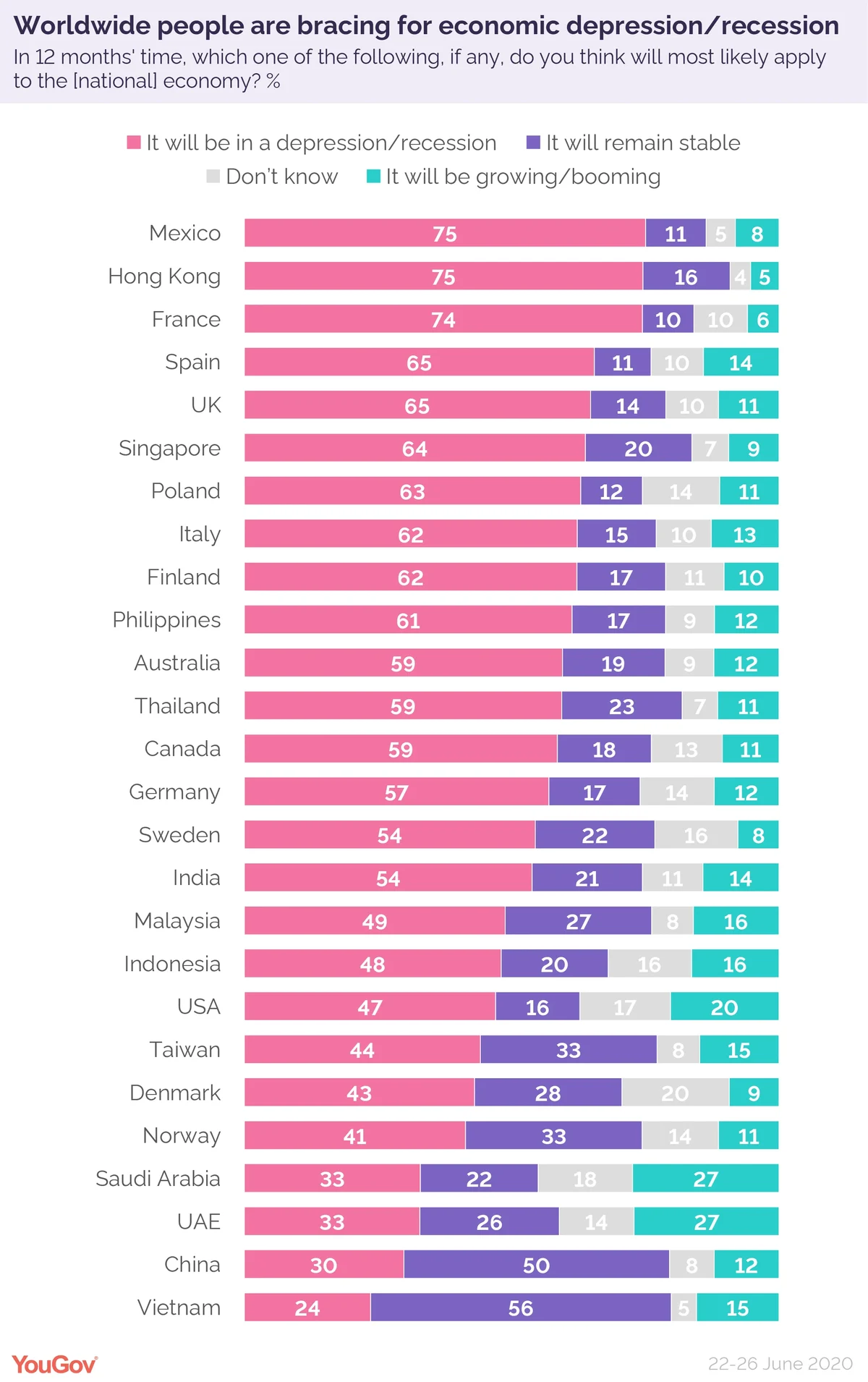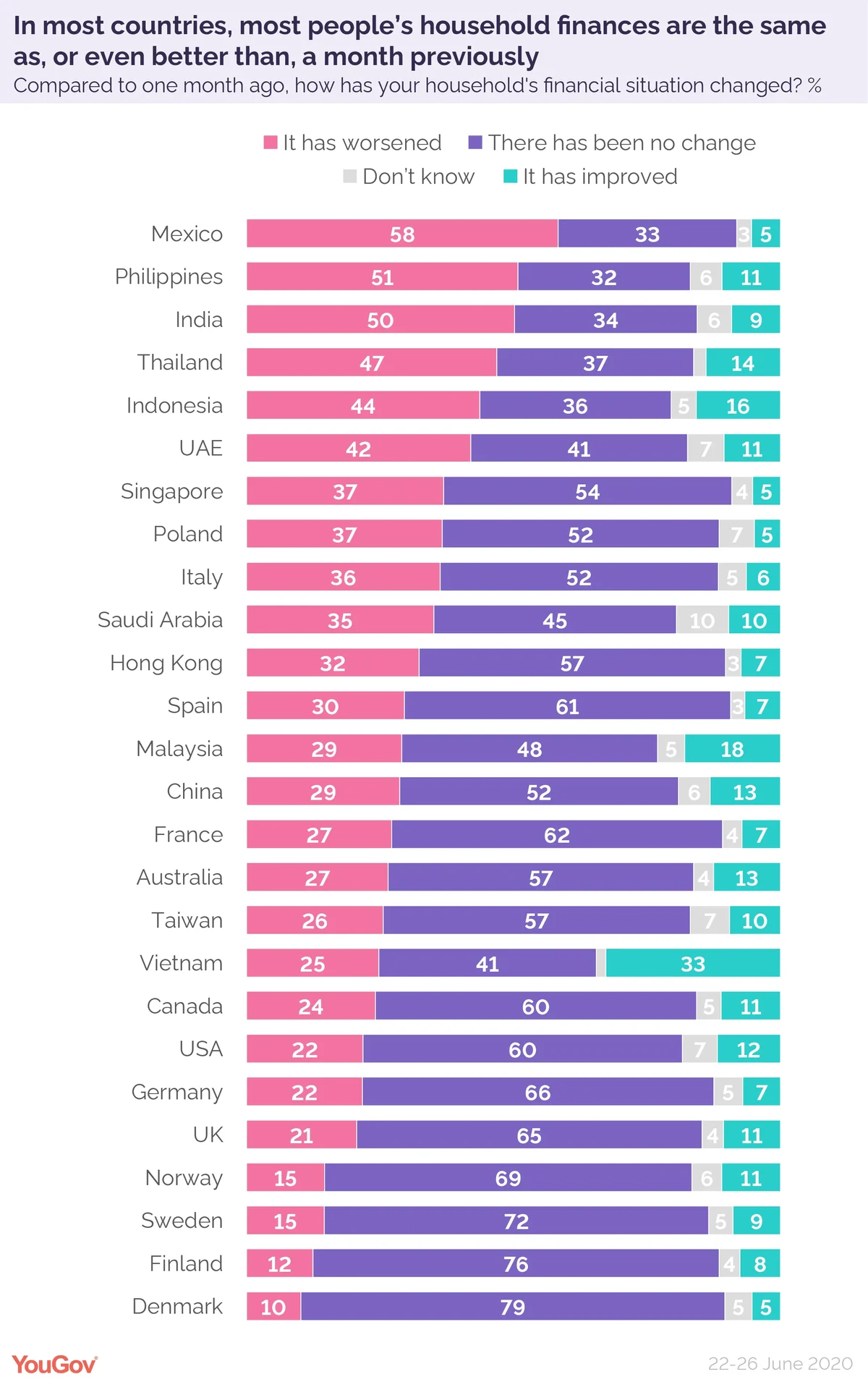YouGov asks more than 27,000 people in 26 countries and regions about their economic circumstances and outlook
Although the coronavirus outbreak is still ongoing across the global, many eyes are turning nervously to the post-COVID era.
Government spending has softened the impact of the disease, but countries are running up huge deficits in order to fund furloughing and public health programmes. In the UK, for example, the budget deficit is set to hit £300bn by the end of the financial year – twice as bad as during the worst year of the financial crisis.
For eight weeks the YouGov economic recovery tracker study has been asking people in 26 countries and regions about their economic circumstances and outlook. Each week we have interviewed more than 27,000 people worldwide.
Recession or depression is the most expected outcome worldwide
Economic pessimism is highest in Mexico and Hong Kong, where 75% of people think the economy will be in a depression or recession in 12 months. This Hong Kong figure stands in stark contrast to people in the rest of China, where only 30% say the same – the second lowest figure for all markets covered by the study.
French people are similarly gloomy about their economic prospects, at 74%, before figures jump down somewhat to 65% for the UK and Spain.
The least pessimistic nation is Vietnam, where only 24% expect a recession or depression. In fact, a majority of Vietnamese people (56%) expect the economy to remain stable for the next year.

Vietnam has weathered the coronavirus outbreak far better than most countries, and our broader coronavirus tracker data shows very high levels of national happiness relative to other countries, and much higher confidence in the actions of the government.
The Middle Eastern nations in the study – the UAE and Saudi Arabia – also have low levels of pessimism, at 33% each, putting them third and fourth from bottom.
The USA also counts itself among the least concerned nations, with a rate of 47% putting it eighth from bottom. In fact, a quarter of Americans (20%) think the economy will be booming a year from now – the third highest after the 27% in the two Middle Eastern countries.
Household finances
The coronavirus crisis has taken its toll on household finances across the world. We asked respondents whether their financial situation was better, worse, or no different to how it was a month ago.
The proportion of people saying that it had worsened ranged from 10% in Denmark to 58% in Mexico.

Out of the 26 countries surveyed, only in six was the most common answer that money had become tighter. Aside from the aforementioned Mexico, this list includes India (50%), Philippines (51%), Thailand (47%), UAE (42%), and Indonesia (44%).
How the outbreak has impacted jobs
The world’s commercial districts have looked more like ghost towns over the last few months, with workers told to secrete themselves indoors in order to stymy the spread of the disease.
Only in Finland (59%), Taiwan (53%), Germany (57%) and the UK (51%) do most workers say their jobs have been unaffected by the virus.
Disruption is highest in Mexico, Saudi Arabia, the UAE, the Philippines and India, where fewer than one in five workers are carrying on as they were before.
Workers suffering the worst case scenario – losing their jobs – are most common in Thailand and Mexico, where 17% of employees found themselves out of work.
Job losses have been lowest in the UK and Finland, where just 2% say they’ve lost their occupation.
Mexico also comes top of the list when it comes to furloughed workers, with 24% on paid absence. In this they are tied with France. Also high on this list are Denmark (20%) and the UK (22%).
Least likely to have been furloughed are workers in Singapore (3%).
Disruption due to unpaid leave is highest in the UAE, where fully one in four workers find themselves employed but find themselves generating no income.
Working hour reductions are highest in Vietnam, at 42%, followed by the Philippines and India (both 32%).
At the same time, in India 21% of workers have seen their working hours increased, the highest level for any country.
Concerns about COVID-19’s economic impact
Large majorities of people in each country and region studied say they are concerned about the prospect of a global recession, ranging from fully 95% of Spanish people to 67% of Norwegians.
Spaniards also rank first in their likelihood to be worried about COVID-19’s impact on local businesses, with 91% expressing fears about this. Least concerned are the Saudis, at 58%.
The other three measures we asked about showed much more varied results between countries.
When it comes to banks failing, the concern in the most worried nation – Indonesia, 80% – is more than fifty percentage points higher than it is in the least worried nation – Sweden, 24%.
Likewise, Filipinos – of whom 87% are concerned about how they are going to pay their bills – are almost five times as likely to say so as Danes, where just 18% face the same problem.
Danes also prove the least concerned about paying for their housing, at just 17%. This contrasts with fully 74% in the most worried country, the UAE.
Looking across all five measures, it appears that Indonesians are the most consistently worried. This is consistent with findings from other YouGov coronavirus trackers which have seen Indonesians topping the list for concern over their health and that of their family, job security, financial security, education and damage to society.
Filipinos are similarly likely to come close to the top of each list.
Consistently at or near the bottom for each concern are the four Nordic nations, as well as Germany.







